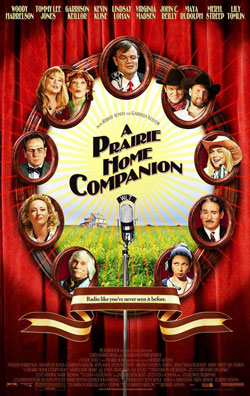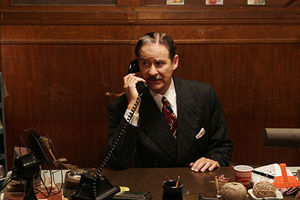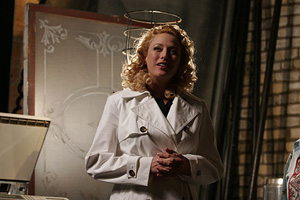 There’s one thing that no one can deny about Robert Altman: he gets good casts. He’s packed his latest, A Prairie Home Companion, with some of the top notch talent working today, and it paid off. The movie’s a joy in the kind of way a movie only can be when the cast is truly having the time of their lives.
There’s one thing that no one can deny about Robert Altman: he gets good casts. He’s packed his latest, A Prairie Home Companion, with some of the top notch talent working today, and it paid off. The movie’s a joy in the kind of way a movie only can be when the cast is truly having the time of their lives.
The film takes place in an alternate universe where Garrison Keillor’s A Prairie Home Companion radio show just isn’t that popular and the theater it’s performed in is about to be razed to make way for a parking lot. The movie spans the last night of the show, and while they don’t play performers, Kevin Kline and Virginia Madsen do have important roles. Kline plays Guy Noir, a character familiar to fans of the radio broadcast; he’s the doorman at the theater who thinks he’s living in a 1940s detective film. He meets and becomes infatuated with Virginia Madsen, an unearthly woman in a white trenchcoat who is hanging around the theater for her own mysterious reasons. She is known only as The Dangerous Woman.
A Prairie Home Companion opens this weekend.
Q: You’re both Altman neophytes? What was that experience like?
Kline: It was exciting. It was unique.
Q: How is it different from working with other directors?
Kline: There’s an implicit, very entitling sensation one gets from the first meetings, where he’s like ‘What do you want to do?’ as opposed to the kind of director, and sadly there are some, who want to impose – they have a vision, you have to fit into their vision. He creates his vision by casting first, and then the whole art design and set decoration, right up to the final edit. It’s a wonderful process; the actor has a unique experience, which is very collaborative. He lets the actor initiate.
Q: Is there pressure to initiate?
Kline: You can bring to the party whatever you want. And whatever you bring is what Mr. Altman will harness.
Q: Is there something he said that helped you define the character?
Kline: Absolutely. He can be a man of very few words. He can be very thoughtful and then say something very simple and pure, if not blunt. We were talking about Guy Noir and I was saying, ‘He’s living in this world – he’s delusional. He thinks he’s in a 1940s film noir and he’s a detective. But he dresses and acts… I’m wondering, does he want to be an actor in the show?’ and then Bob says, ‘Well, he’s a nut.’ ‘….Oh! OK.’ It was the simplest thing.
Then a week later, at the second meeting, he said ‘I’m thinking about starting the film with a narration from your character.’ Talk about an unreliable narrator. That really skews it, if it’s from his point of view. Anything could happen, because he’s got his own histrionic drama of life happening. But it was great. And then he just lets you go.
Q: Virgina, what’s it like being ‘The Dangerous Woman"?
Madsen: Imagine my dilemma – how do I do that? It’s a very similar story that Kevin shared. When I came to –
[her phone rings]
Oh my gosh, that’s my son. We have an ongoing drama!
Kline: I’ll finish. When I came to the part of the Dangerous Woman, I thought, ‘hmmm.’ We talked about how to play the Angel and how ethereal should it be, how grounded it should be, and why does she do what she does, and Bob said, ‘You’re dead.’ Why am I walking so slowly? ‘You’re dead.’
Madsen: That slows you down.
 Q: How does ‘You’re a nut’ help you as an actor?
Q: How does ‘You’re a nut’ help you as an actor?
Kline: It focuses me.
Madsen: It makes it simpler.
Kline: Instead of trying to find a subtext that would have been worthless once it was found; that he wanted to be in the show, that he was one of those fringe characters of whom I have known many – he’s the doorman, but he has an exalted sense of his own value and thinks of himself as a guardian. But he dresses and behaves and speaks from another period – from a fictional period and genre. It’s bizarre.
Madsen: I love that he has to be on stage. Even though he’s investigating, looking for clues, he manages to get himself on stage regularly.
Kline: There is a little, nagging question as to whether he should be on stage at that moment, but it’s very distant in his mind.
Q: Robert Altman is a national treasure, but he’s been advancing in years. How has his energy been holding up?
Kline: Indefatigable. We did an all-night shoot in the diner.
Madsen: I went home.
Kline: For anyone at that age – it’s miserable for the youngest person on a crew; suddenly your circadian rhythm is up for grabs and it’s 4 in the morning and your body is saying, What are you doing here, and you have to do some intricate, difficult scenes. And he was great. He never flagged for a moment. We ended that night as dawn was chasing us away, with that opening shot. The crane shot at the diner.
Q: Were you surprised by how the film came together in the end?
Madsen: Surprised at the end conclusion, yeah. It read really well, and both of us knew the radio show very well. It seemed like a wonderful tale to tell, and it was filled with so many colorful characters. But as we were filming, there was just so much that he was capturing, and how was he going to put it together and have it make any sense, and how would he construct it? I don’t know how he did that.
Kline: It was the totality that surprised me. The feeling; it made me feel this elegiac, upbeat, romping, lament. These people soldiering on in the face of death and entropy and the finality of things, with the attitude of ‘The show must go on,’ and that American show business spirit, as crass as it can get. It came through and I was very touched by it, just touched by Garrison’s seeming indifference to it: ‘A moment of silence on the radio? I don’t know how that works.’ He’s so impenetrable and yet so stoic, and there’s a great strength. When he tells Lindsey Lohan, ‘How can we mourn [a character who dies]? By doing our job.’ This work ethic, this great generational gift. There are things that are very touching while some of it is very silly. And then there’s that music, which just buoys up the movie and the audience’s appreciation of it. That’s how it was on the set, too. There’s always the band there.
Madsen: The band was playing all day. It was great.
Q: Virginia, going back to your character, did Garrison and Altman know what they were going to do with her?
Madsen: I came to work and got ready, you know, physically. He had a very specific film noir/femme fatale [look], but I don’t think they knew where I was going to be, what I would be doing except for the scripted scenes, and then he just had this kind of idea that he wanted me floating in the background, or maybe I should be in the [prop] house, and I liked the idea of being in the window. And that’s often what he would have me do. Lots of times he would have me in the background, and if it didn’t work he would take me out. There was a whole long sequence that was taken out where I was wandering around [backstage]. It was taking the focus from the players.
Q: We’ve talked about working with Altman, can you talk about working with Garrison Keillor to create your characters?
Kline: I think Garrison is enough of an artist himself to appreciate that he was handing over his baby to another artist, and he was deferential. There was always a sense – and not that it needed to reiterated or underscored in any way – that this was Mr. Altman’s movie. He supplied the raw material, ideas and ambience, etc, and he’s there himself, but that was the maestro and he was one of the players.
Q: How much of the actual script made it onto film?
Madsen: Almost all of it.
 Kline: And then some. There was a scene Maya Rudolph and I were supposed to do, listening to the show on the radio. On the day, Bob said, ‘I don’t like that. Why don’t you call her from the phone in the lobby and she’ll come out and you’ll think she’s in another room.’ There were no scripted lines for that scene except ‘Take this note to the Dangerous Woman,’ and we changed that to ‘That this note to the lady in the white trenchcoat.’
Kline: And then some. There was a scene Maya Rudolph and I were supposed to do, listening to the show on the radio. On the day, Bob said, ‘I don’t like that. Why don’t you call her from the phone in the lobby and she’ll come out and you’ll think she’s in another room.’ There were no scripted lines for that scene except ‘Take this note to the Dangerous Woman,’ and we changed that to ‘That this note to the lady in the white trenchcoat.’
Q: That last scene at the diner was an improv, right? [Swipe to read the spoiler] Where she appears and you point your finger at everyone?
Kline: That was bizarre. That was not what was scripted. What was scripted was that she just appears in the doorway. We shot one or two like that, and then Bob said, ‘Come in the door and come right up to the table. And you all see her.’
Madsen: Yeah, because they never saw me. Only you did.
Kline: Right then the cameras were rolling and there was no time to think. OK, we see her… Then I pointed and thought he would hate it. But that’s the freedom he gives you, to do something silly like that.
Q: Were all of you on set all the time?
Kline: When I saw the script I thought Guy Noir was four days of work. But the scene doesn’t ever end – when the scene ends the camera drops back and you’re in the background. There’s a simultaneity of action going on all the time – on stage, off stage, below stage.
Q: Did you know when you would be on camera?
Kline: He said this wasn’t going to be master, medium, close up, over the shoulder. Never. Never was it, ‘This is your close up.’
Madsen: They were never setting up your shot.
Kline: There were four cameras, so you never knew – you knew he was getting a piece of something there.
Q: So it felt more like a play.
Madsen: Yeah, because you’re always in the scene.
Q: Can you talk about the dynamic of the cast? Virginia, you worked opposite Garrison, who doesn’t have a lot of acting experience.
Madsen: He’s such a unique personality. He’s such a mystery. I noticed in my first days there that he just walked on to a set and did a scene with Meryl Streep and then he just left. He was like, ‘OK, when’s lunch?’ I was like, is something wrong with him? How can anyone do that? I don’t care who you are! And it was a long walking and talking and a lot of dialogue to memorize and it didn’t faze him. He said, ‘Why would it?’
Kline: It’s that mid-western faux-nonchalance. Nothing fazes us. He went and vomited after.
Madsen: I wanted to defer to him when I was doing my scene with him. I was like, ‘Is everything alright, Garrison, am I doing it right?’ I wanted his input; it’s his show. He said, ‘It’s good. Very good.’ And that’s all I got!
Kline: After the farting scene, which we just did in the first take because a person who will be unnamed – it wasn’t I – had this little fart machine. We said, ‘Don’t do it in the rehearsal, we’ll just do it when he’s rolling.’ We did all the lines and all the action and we just added this fart. Garrison was there watching this scene, and later I said, ‘Are you OK with the farting? I know you didn’t write that; is it over the top? Did we cross a line there?’ ‘Oh no, no, we do fart jokes on A Prairie Home Companion all the time.’
Q: Both of your characters stand apart from the show. Did you guys give that some thought, did it play into your choices?
Kline: We were extra. Meta. Sub. Those are all the prefixes. But yeah, we’re not the performers on the show; I’m the gatekeeper, and she’s… what is she? This Dangerous Woman.
Madsen: And then Tommy Lee Jones, who I think was the Devil.
Kline: You can interpret it so many ways.
Madsen: I had such conversations about who he was, and Bob would never tell me. I said, ‘Do you know what he was?’ and he said, ‘Yeah, but I’m not telling you.’
Kline: All of those stories backstage with Garrison Keillor, how he got into radio, and each one is different, and you can’t follow any of them. Or can you? I think there’s this wonderful obfuscation – why should the truth matter? Make it a good story. It just tickles me.